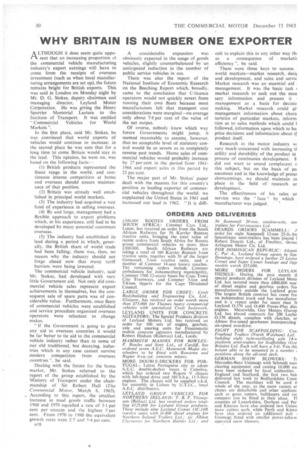WHY BRITAIN IS NUMBER ONE EXPORTER
Page 52

If you've noticed an error in this article please click here to report it so we can fix it.
A LTHOUGH it does seem quite appaPI rent that an increasing proportion ot the commercial vehicle manufacturing industry's export earnings will have to come from the receipts of overseas investment (such as when local manufacturing arrangements are set up), the future remains bright for British exports. This was said in London on Monday night by Mr. D. G. Stokes, deputy chairman and managing director, Leyland Motor Corporation. He was giving the Henry Spurrier Memorial Lecture to the Institute of Transport. It was entitled "Commercial Vehicles for World Markets ".
In the first place, said Mr. Stokes, he was convinced that world exports of vehicles would continue to increase; in the second place he was sure that for a long time to come Britain would stay in the lead. This opinion, he went on, was based on the following facts:—
(1) British products represented the finest range in the world, and continuous intense competition at home and overseas should ensure maintenance of that position.
(2) Britain was already well established in principal world markets.
(3) The industry had acquired a vast fund of experience in selling overseas.
(4) By and large, management had a flexible approach to export problems which, in his experience, still had to be developed by many potential customers overseas.
(5) The industry had established its lead during a period in which, generally, the British share of world trade had been falling; there was, then, no reason why the industry should not forge ahead now that many tariff barriers were being lowered.
Thecommercial vehicle industry, said Mr. Stokes, had developed with very little Government aid. Not only did commercial vehicle sales represent export achievements in themselves, but the consequent sale of spare parts was of considerable value. Furthermore, once fleets of commercial vehicles were established and service procedure organized overseas operators were reluctant to change makes.
• " If the Government is going to give any aid to overseas countries it would be far better to tie aid to the commercial vehicle industry rather than to some of our old traditional, but decaying, industries which in any case cannot survive modern competition frorn overseas countries ". he said.
Dealing with the future for the home market, Mr. Stokes referred to the report of the group established by the Ministry of Transport under the chairmanship of Sir Robert Hall (The Commercial Motor, March 8, 1963). According to this report, the smallest increase in road goods traffic between 1960 and 1970 equalled a rate of 3-1 per cent per 'annum and the highest 5 per cent. From 1970 to 1980 the equivalent growth rates were 2-7 and 5.4 per cent.
u18 A considerable expansion was obviously expected in the usage of goods vehicles, slightly counterbalanced by an anticipated reduction in the number of public service vehicles in use.
There was also the report • of the National Institute of Economic Research on the Beeehing Report which, broadly. came to the conclusion that C-licence operators would not quickly revert from running their own fleets because most manufacturers felt that transport cost considerations were marginal—on average only about 7-8 per cent of the value of the net output.
Of course, nobody knew which way future Governments might jump; it seemed reasonable to assume, however, that no acceptable level of statutory control would be so severe as to completely reverse past trends. Home sales of commercial vehicles would probably increase by 27 per cent in the period from 19611966 and export sales in this period by 25 per cent.
The major part of Mr. Stokes' paper dealt with the reasons for this country's position as leading exporter of commercial vehicles throughout the world; we supplanted the United States in 1961 and increased our lead in 1962. "It is diffi
cult to explain this in any other way thz as a consequence of marketii efficiency ", he said.
There were three keys to success world markets—market research, desig and development, and sales and servic Market research was an essential aid management. It was the basic task market research to seek out the nece sary information and present it I management as a basis for decisio making. Market research could gi, management information about chara teristics of particular markets, inform: tion as to sales methods which could t followed, information upon which to ba! price decisions and information about tt product itself.
Research in the motor industry m very much-concerned with increasing tt utility and durability of the product in process of continuous development. Fl did not want to sound complacent c this subject, but on the basis of pa successes and in the knowledge of presei shortcomings, we should maintain ot place in the field of research ar development.
-The effectiveness of his sales an service was the " face " by which manufacturer was judged.




















































































































